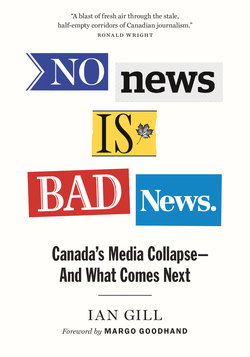Читать книгу No News Is Bad News - Ian Gill - Страница 7
На сайте Литреса книга снята с продажи.
ОглавлениеFOREWORD
WHO IS TELLING Canada’s stories? Does anybody care? Why should we?
A lot of Canadians are looking for answers these days as the nation’s newsrooms rapidly diminish.
With corporate concentration at an all-time high and those few owners challenged by plummeting ad revenues and an obsolete business model, the long-term outlook for traditional media in Canada has never looked so grim.
Print and broadcast media have been shedding journalists over the past decade or so, but the situation was never so stark as it became in 2015, as the debt-laden Postmedia, which already owned most of Canada’s major daily newspapers, borrowed more money to buy up the equally challenged Sun Media chain of more than 170 smaller dailies and weeklies.
By early 2016, despite the massive and uncontested takeover, Postmedia teetered on the brink of bankruptcy. Breaking its own vows to keep its newsrooms separate and competitive, the company laid off dozens more journalists (including me, and with more to follow), and merged Sun and Postmedia newsrooms in Edmonton, Ottawa, Vancouver, and Calgary.
Into the middle of this mess cheerfully wandered writer and social entrepreneur Ian Gill, a former print and broadcast journalist at the Vancouver Sun and the CBC, and currently a regular columnist for the Tyee.
Gill set off to explore how other countries—from Italy to the UK to Australia to the US—are coping with the inevitable erosion of mainstream media in this digital age, and what is starting to emerge in its place.
He talked to insiders and innovators, and in this intelligent and highly opinionated critique offers keen insights into today’s media landscape, and better yet, hope for the future.
There are no sacred cows in his lively and engaging analysis, which takes on everyone from the CBC to the Globe and Mail in a breezy style which will make you laugh, wince, and most importantly think.
His assessment rings true, particularly for those who, like me, have lived through the slow, shuddering decline of the Canwest and then the Postmedia/Sun Media empires. But it also goes further than a number of recent books and articles on this topic, specifically seeking out a wide variety of experts on the latest and most promising forms of media.
Other countries, Gill notes, have successfully made a head start with new and economically viable models, even as Canada remains “stuck in a decade-old holding pattern” of aging (and listing) media corporations.
He makes the point that it is clearly time to shake off the status quo, but he also never loses sight of his core principle: that a healthy media makes a healthy democracy.
No News Is Bad News is essential reading for anyone who wants to better understand how we got here, where we’re headed, and maybe, just maybe, how we might make things better.
—MARGO GOODHAND
Margo Goodhand is the former editor of the Edmonton Journal and the Winnipeg Free Press, and most recently the author of Above the Fold on TheWalrus.ca, a look at the state of Canada’s newspaper industry.
